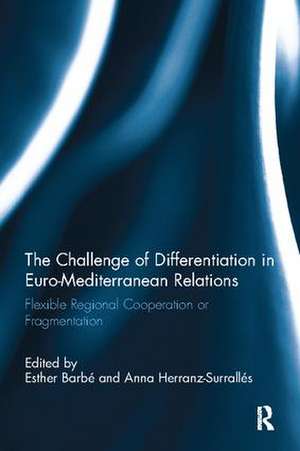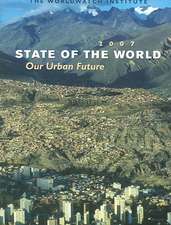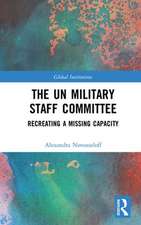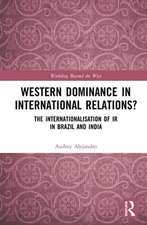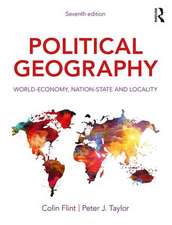The Challenge of Differentiation in Euro-Mediterranean Relations: Flexible Regional Cooperation or Fragmentation
Editat de Esther Barbé, Anna Herranz-Surrallésen Limba Engleză Paperback – 24 mai 2017
This book contributes to theoretical and practical debates on whether differentiation processes can aid or hinder policy convergence processes and region-building efforts more widely. The contributions to this collection assess the actual significance and consequences of differentiation in Euro-Mediterranean relations through sector-specific in-depth analyses, covering issue areas as varied as environmental policy, migration, foreign and defence policy, trade, energy, civil protection and democracy promotion. The particular angle and comprehensive analysis of this book will make it of great interest for both scholars and policy makers alike in a moment when Euro-Mediterranean are in need of a thorough rethink.
This book was based on a special issue of Mediterranean Politics.
| Toate formatele și edițiile | Preț | Express |
|---|---|---|
| Paperback (1) | 299.52 lei 6-8 săpt. | |
| Taylor & Francis – 24 mai 2017 | 299.52 lei 6-8 săpt. | |
| Hardback (1) | 764.87 lei 6-8 săpt. | |
| Taylor & Francis – iun 2012 | 764.87 lei 6-8 săpt. |
Preț: 299.52 lei
Preț vechi: 341.57 lei
-12% Nou
Puncte Express: 449
Preț estimativ în valută:
57.33€ • 62.30$ • 48.19£
57.33€ • 62.30$ • 48.19£
Carte tipărită la comandă
Livrare economică 21 aprilie-05 mai
Preluare comenzi: 021 569.72.76
Specificații
ISBN-13: 9781138110212
ISBN-10: 1138110213
Pagini: 176
Dimensiuni: 156 x 234 mm
Greutate: 0.45 kg
Ediția:1
Editura: Taylor & Francis
Colecția Routledge
Locul publicării:Oxford, United Kingdom
ISBN-10: 1138110213
Pagini: 176
Dimensiuni: 156 x 234 mm
Greutate: 0.45 kg
Ediția:1
Editura: Taylor & Francis
Colecția Routledge
Locul publicării:Oxford, United Kingdom
Public țintă
Postgraduate and ProfessionalCuprins
1. Introduction: Dynamics of Convergence and Differentiation in Euro-Mediterranean Relations: Towards Flexible Region-Building or Fragmentation Esther Barbé and Anna Herranz-Surrallés 2. Convergence on the Fringe: The Environmental Dimension of Euro-Mediterranean Cooperation Oriol Costa 3. Security, Governance and Community beyond the European Union: Exploring Issue-level Dynamics in Euro-Mediterranean Civil Protection Niklas Bremberg 4. What Prospects for the Lifting of Technical Trade Barriers in the Mediterranean? Insights from the Turkish case Frédéric Misrahi 5. Convergence towards Differentiation: The Case of Mediterranean Energy Corridors Gonzalo Escribano 6. Converging, Diverging and Instrumentalizing Security and Defence Policy in the Mediterranean Eduard Soler i Lecha 7. Differentiation and Policy Convergence against Long Odds: Lessons from Implementing EU Migration Policy in Morocco Daniel Wunderlich 8. Conditionality, Differentiation, Regionality and the "New" ENP in the Light of Arab Revolts Tobias Schumacher
Recenzii
‘[The book] challenges the impact of differentiated dynamicsof cooperation with Southern and Eastern Mediterranean Countries (SEMC) on policy convergence and region building in diverse policy fields. It is a very good reference for approaching the complex debate about Euro–Mediterranean relationships.'
- Federica Zardo is a PhD candidate in Political Science and International Relations at the University of Turin.
- Federica Zardo is a PhD candidate in Political Science and International Relations at the University of Turin.
Descriere
In view of the so-far unsuccessful attempts to establish region-wide mechanisms of multilateral cooperation in the Euro-Mediterranean area, this book enquires whether more differentiated forms of cooperation can trigger positive dynamics of convergence, or on the contrary, more fragmentation in a region already affected by deep political, economic and social divisions. The contributors to this collection assess this policy-relevant question through careful theoretical reflection and in-depth case studies in a number of policy domains.
This book was originally published as a special issue of Mediterranean Politics.
This book was originally published as a special issue of Mediterranean Politics.
